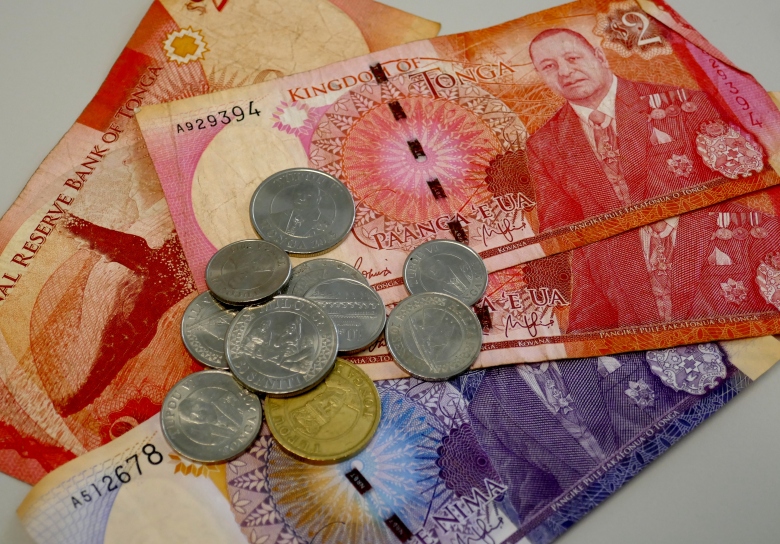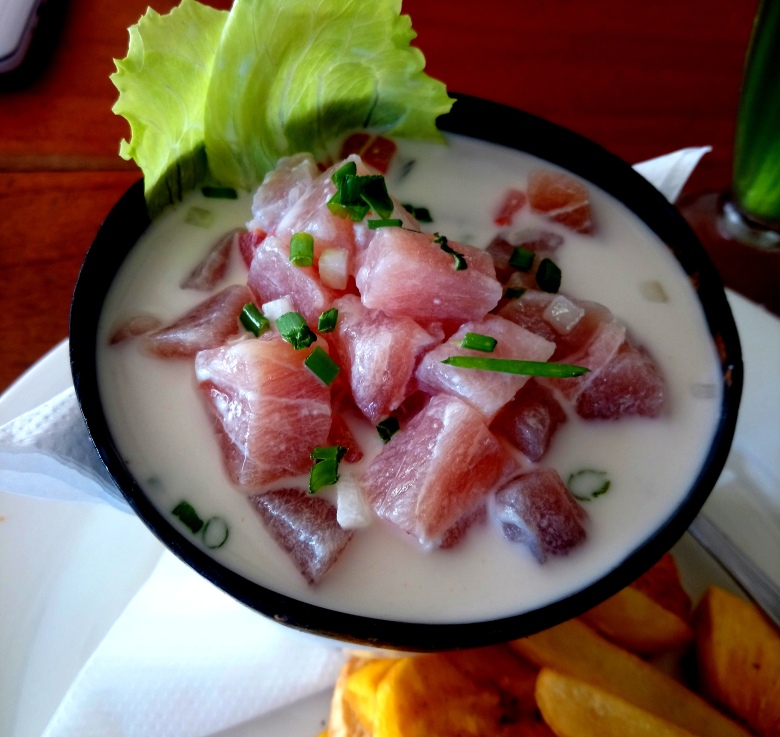Capital: Nuku’alofa
Inhabitants: 130.000
Area: 748 km2
Inhabited islands: 36 (out of 169)
Languages: Tongan
Around the island: 108 km (around Tongatapu)

The Passport Party
One reason for loving borders: It’s a sudden change in culture, language, architecture – sometimes even landscape. You don’t get that in Oceania: The islands are far apart, and fairly similar. The “border crossing” from Fiji to Tonga finally was different in that perspective. It was a crossing from Melanesia to Polynesia – culturally quite a change. But also landscape and climate were different: I found Tonga to be far colder and dryer than the other Pacific islands. And I was happy about that: Too many humid jungle countries before!
The passport party itself was less impressive. Tonga’s Fua’amotu International Airport is the usual Oceanian mini-airport, so it took only 10 minutes to get the huge stamp of the Kingdom of Tonga. Time enough to learn my first Tongan word: “Mālō e Lelei” – welcome! – as a big sign right on the runway said.
 Fua’amotu International Airport
Fua’amotu International Airport
What makes Tonga unique
- The Tongan people are extremely relaxed. Everyone moves slowly, even most cars drive much below the speed limit. And being fat is the beauty standard, to which many locals adhere.
- The only day in the week the Tongans get really active is on Sunday: Everybody heads to the churches, some for three or four masses on one day! People are rather severe in their Christianity, so everything is closed on Sundays – much like on Fridays in Iran! It’s even hard to find an open restaurant in the capital, so the few expats head out for resort islands to spend the day.
- Tonga produces a range of decent craft beers, which is rare in Oceania: Most Pacific islanders prefer light lagers. I particularly liked the Tiki Pale Ale of Pacific Brewing Co. Maybe an influence from New Zealand, whose products (and beers) are very visible here. That’s quite a difference to most other Oceanian nations, where Australia is the obvious big neighbour.
- Tonga is the only monarchy in Oceania – the ruling dynasty of Tupou is in power since almost 200 years! Only in 2008, the islands opened a bit towards more democracy. But still it is forbidden to walk along the seashore in front of the Royal Palace in downtown Nuku’alofa. A palace that is less than impressive: Just a big wooden villa. Good to have such modest kings!
- Tonga is the Ethiopia of the South Seas: It’s the only country of Oceania that has never been a colony. For a couple of decades, Tonga was a British protectorate, but the Brits never interfered in local affairs and didn’t touch the monarchy. Like the Ethiopians, the Tongans are extremely proud of that fact. I indeed met marihuana-smoking locals who were very interested in Ethiopian history!
- Tongans traditionally wear reed mats. Yes: real mats, they’re not only called like that. Mats would look ridiculous as clothing on Europeans. Tongans, however, bring the necessary “size” for wearing such a dress. The mats are sold on local markets and worn by many locals.
 The Royal Palace in Nuku’alofa
The Royal Palace in Nuku’alofa
My best experience
…was sitting on the terrace of Reload Bar, overlooking Nuku’alofa’s sleepy main street and enjoying a Tiki craft beer. Doesn’t sound like much. But my introduction into Oceania had been eventful: The Solomon Islands proved that cultural shocks are possible even with a lot of travelling experience, and Nauru was that unique and special that I couldn’t sit calmly for long. So I was pretty exhausted once I arrived to Tonga – and very pleased to find Nuku’alofa, its capital, a laid back place. There was not much to do, and I was happy to have some days to relax.
 Nuku’alofa’s main street
Nuku’alofa’s main street
My worst experience
I took a day trip to a resort: ‘Atata island, just off Tongatapu. Being in Oceania, I once wanted to do what most tourists come here for: Hanging out at the beach, snorkelling and sipping drinks out of coconuts. It was all well organised, the staff friendly and the food mediocre (they don’t serve local food at such places) – absolutely fine. It was not even boring. But apparently not to my liking, although I have tried. I just hate sitting in the sunshine, and swimming in the ocean is done after half an hour. While I like hanging out and reading a bit, there are definitely better places for that. That was bad news for me, since most tourism in the Pacific Islands is resort-based… At least it was nice to see the village on the island.
 Royal Sunset Island Resort on ‚Atata Island
Royal Sunset Island Resort on ‚Atata Island
National symbols
 Immigration form of Tonga.
Immigration form of Tonga.
 Pa’anga (TOP) banknotes and coins. 1 USD equals about 2 TOP.
Pa’anga (TOP) banknotes and coins. 1 USD equals about 2 TOP.
 The parliament of Tonga is located in a wooden shed. It’s possible to visit upon announcement, but only if wearing traditional Tongan clothing.
The parliament of Tonga is located in a wooden shed. It’s possible to visit upon announcement, but only if wearing traditional Tongan clothing.
Did you know that…
…almost all grocery shops in Tonga have Chinese owners? In Tongan culture, individuals are expected to share their food with their extended family and any friends. A local shopkeeper would go bankrupt in no time.
…Tonga has a Ministry of Meteorology, Energy, Information, Disaster Management, Environment, Climate Change and Communications (MEIDECC)? The administration of Tonga is lean, so the MEIDECC minister must be properly polyvalent.
…there is a palm tree with three heads on Tongatapu Island that counts as a touristic sight? It seems to be so famous that several regular street signs all over Tongataup indicate the road towards it.
…there are pigs who know how to fish? Those pigs can be found in the Northeast of Tongatapu, strolling along the coast and trying to catch fishes during high tide.
…the main security risk in Tonga is pub brawls? Back in 2006, however, there was real political violence, and the phlegmatic and peaceful Tongans managed to burn down the whole town centre of Nuku’alofa.
…it’s next to impossible to buy a house in Tonga? The locals are extremely reluctant to sell land, so they’d rather lease it for 10 or 50 years.
 Ministry of MEIDECC in Nuku’alofa
Ministry of MEIDECC in Nuku’alofa
International transport: Several weekly connections link Tongatapu’s Fua’amotu Airport with New Zealand and Fiji. Less frequent are the flights to Samoa and Australia. There are no regular international ferry or boat services.
Inland transport: Real Tonga Airlines, the national carrier, provides only domestic flights, apart from a very recently introduced flight to Samoa. The islands of Vava’u and ‘Eua are served daily, other destinations less frequently. There is one weekly ferry connection from Nuku’alofa via the Ha’apai Group to Neiafu on Vava’u, leaving the capital on Monday evenings.
Accommodation: There’s a wide range of different standard hotels in Nuku’alofa and Neiafu, plus some guesthouses in the Ha’apai group. Apart from that, some tourist resorts outside of the populated places are mainly frequented by New Zealanders.
Food: Tonga’s cuisine features typical Polynesian dishes, mainly based on raw tuna, pork meat and local vegetables such as taro or breadfruit. Ota Ika, the national dish, is a particular delicacy: Raw tuna in a marinade of coconut milk and lemon juice, with onion and chili. Unfortunately, locals prefer international fares when eating out, so finding decent local food can be challenging outside of the capital. “Friend’s Café” in Nuku’alofa serves a great Ota Ika, though. Most tourist resorts offer rather bland international standards such as Fish & Chips.
 Ota Ika – the best food I had in Oceania.
Ota Ika – the best food I had in Oceania.Money: Tonga’s currency is called Pa’anga, but locals often refer to it as dollars when speaking English. Cash is easily available in exchange booths in Nuku’alofa and at the airport, and there is a couple of ATMs. I generally had no problems paying with credit cards.
Communication: Local telecom providers hand out SIM cards to tourists for free, sometimes even including data. Local SIM cards, however, are not essential: Roaming with foreign cards works, and Wifi is quite easily accessible in most hotels and restaurants.

What a great report about Tonga and the habits there.
LikeLike
Thank you, Oliver, for your feedback 🙂
LikeLike